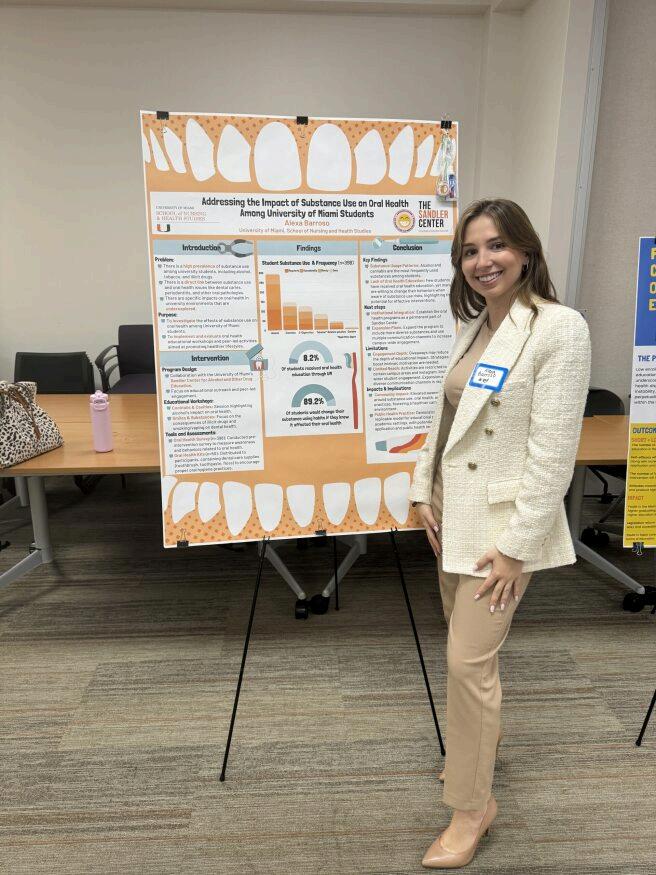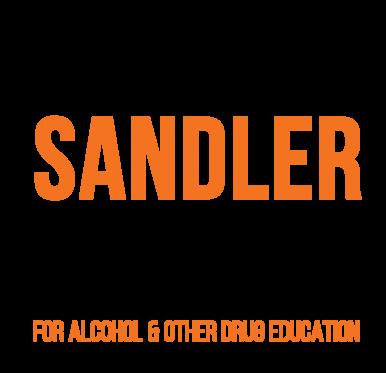





Abigail Schcolnik, Aditto Showkat, Alea Voyer (Spring), Alexa Barroso (Spring), Daphne Mall, Isabel
Hembrough, Mecca McCain (Fall), Natasha Epps (Fall)
Nathan Sherman, Ryan Berman
Jada Thomas | Public Health Graduate Assistant
Elizabeth Stamerra (Fall) & Farid Mawanda (Spring) |
Student Affairs Graduate Assistant
Rachel Perse | Assistant Dean and Director

. Sandler, Jr. Center for Alcohol Education is a comprehensive ervention, education, and m focusing on alcohol and other e, and dependency. By working with all members of the campus strive to:
althy lifestyles, as well as d social responsibility, by nd/or supporting educational rainings, community service, tive social activities for
dents about the negative health nsequences of high-risk use of other drugs.
areness and commitment university community to safety ntion.
nvironment in which a change behaviors, and use of s possible and participation in haviors is reduced.
Through peer education and collaboration with campus partners, the Sandler Center provides outreach and support to empower students to make informed and responsible decisions throughout their lives.

Highlighted Topics Covered:
Binge drinking, medical amnesty, drugged drink prevention, vaping, cocaine, drunk driving, Narcan & overdose prevention, alcohol poisoning, cannabis, bystander intervention, and oral health
Highlighted Collaborative Partners: Orientation, Healthy ‘Cane Network, URecovery, Housing & Residential Life, Greek Life, UMPD, and F Fentanyl
84
Total Programs
112 Hours of Education
6,670 Student Interactions
DaphneMall, SeniorPeer Educator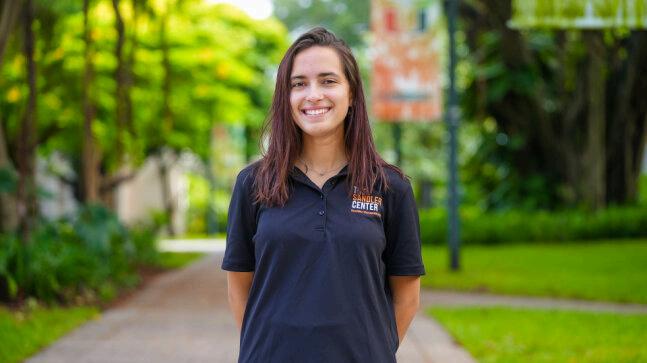
“What I love most about the Sandler Center is the workplace atmosphere of collaboration, creativity, and care for each other and the students at University of Miami. Being able to practice problem solving, programming, and presentation skills through the community service of educating on alcohol and other drugs is one of the most unique and character developing jobs on our campus.“
 AlexaBarroso, SeniorPeer Educator
AlexaBarroso, SeniorPeer Educator
“It has been an honor to develop and implement programs focused on health issues that often go under-researched. I am particularly proud of our ability to engage and educate a diverse student population, spreading awareness and fostering a more informed community on crucial public health matters.”
This year, we continued our pop up programs in the residential colleges during the first six weeks of the semester. This time period is when many high-risk drinking behaviors occur. The Green Zone represents a blood alcohol content where functioning won't be significantly impaired and the negative effects of drinking have been lowered. Students are encouraged to practice healthy behaviors to stay in the Green Zone and avoid the Red Zone.


944
94% of attendees knew ways to stay in the Green Zone
96% of attendees understood the dangers of mixing alcohol and drugs
Each year, the Sandler Center joins nearly 1,000 colleges across the country in observing National Collegiate Alcohol Awareness Month throughout the month of October. In Fall 2023, peer educators continued to promote alcohol education in a comprehensive, engaging way by developing activities and collaborating with campus organizations. This year, our theme was "Sandler Park," with our educational activities and promotional materials focusing on a Jurassic Park/dinosaur theme.
Medical Amnesty
Mixing Drugs & Alcohol
Drugged Drink Prevention
Alcohol Safety


379 students participated Overall, 94% of attendees met the learning outcomes
96% of attendees felt confident in their ability to stay safe when drinking

“One of my favorite Sandler Center memories was hosting a multicultural focus group where we asked students of color about our impact on campus and how we can improve. It was really heartwarming to hear how the Sandler Center is always an organization that they can rely on for alcohol and other drug education and support and how our efforts on campus have helped students like themselves.”
 IsabelHembrough, JuniorPeer Educator
IsabelHembrough, JuniorPeer Educator
“My favorite part of working at the Sandler Center has been the opportunity for personal and professional development alongside other amazing student leaders. During my time here, I've improved my public speaking, graphic design, and communication skills, all while having creative freedom to build programs and design merchandise collaboratively with talented peers. I'm incredibly thankful for the opportunities the Sandler Center has given me and the extraordinary people I have gotten to work alongside.”
This year we expanded our overdose prevention initiatives, furthering our campus reach. As fentanyl remains a major issue in Miami and across the US, we wanted to ensure UM students have as much information and resources as possible. We aimed to provide Narcan, a life-saving medication that reverses opioid overdoses, to students. We have provided over 1,400 doses to 662 students this academic year.
At our annual Candlelight Vigil honoring lives lost to overdose, we received a Proclamation of Overdose Awareness Day from Miami-Dade County Mayor Daniella Levine Cava.


In Fall 2023, Narcan display boxes were placed in all on-campus residential colleges. These boxes ensure residential students have access to Narcan in case of an emergency.
In collaboration with the Interfraternity Council, we have installed Narcan display boxes in 3 on-campus fraternity houses. All fraternity members participated in Narcan training as well.
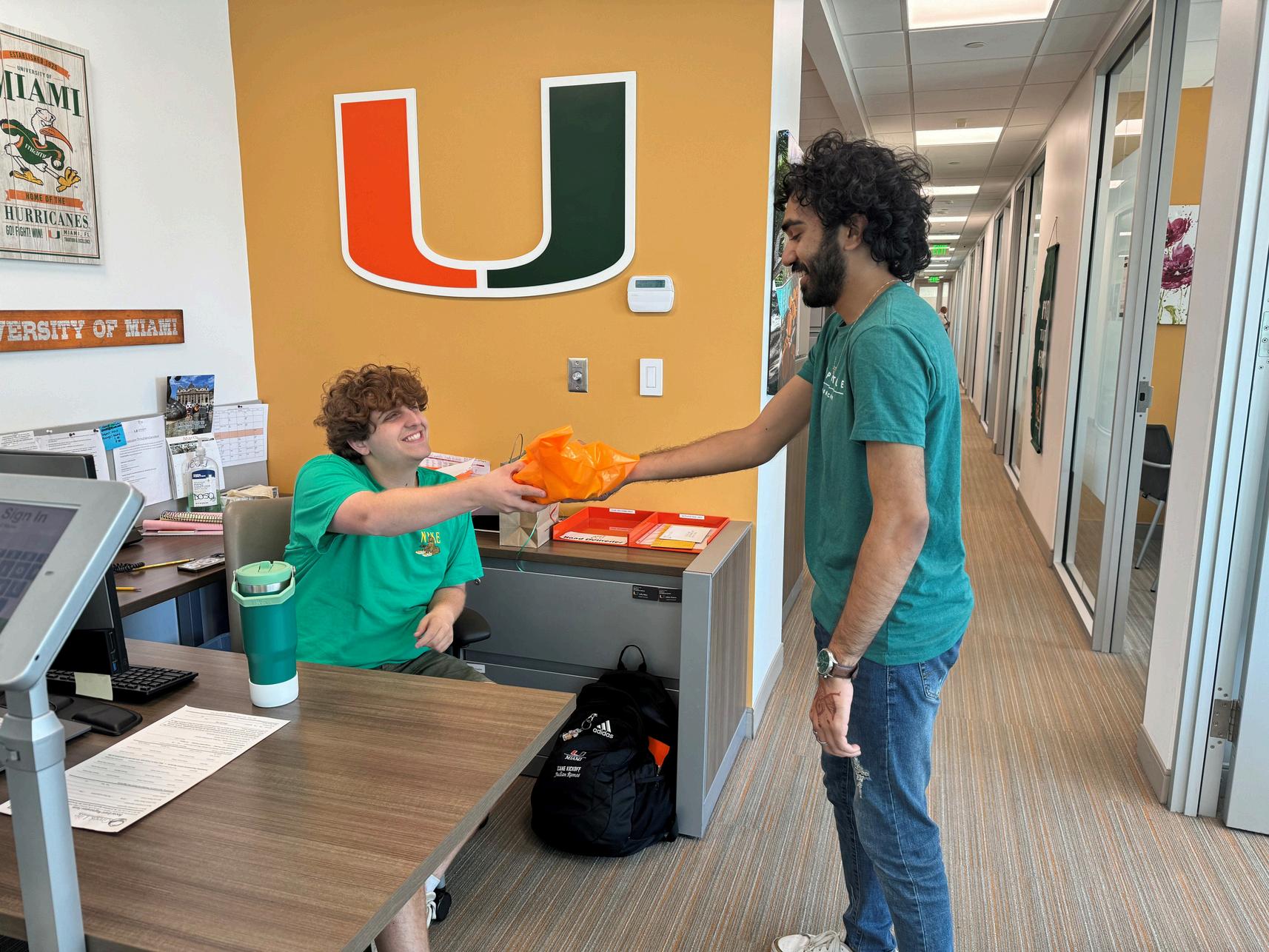

This year we piloted our Safety Kit Pickup Program, through which students can request fentanyl testing strips, Narcan, Nightcaps, and drink testing cards at no cost. We have had 150 students utilize our program.
At Narcan trainings, attendees learn how to spot an opioid overdose, how to use Narcan, and prevention tips. 100% of attendees feel more comfortable using Narcan in an overdose situation post-training.
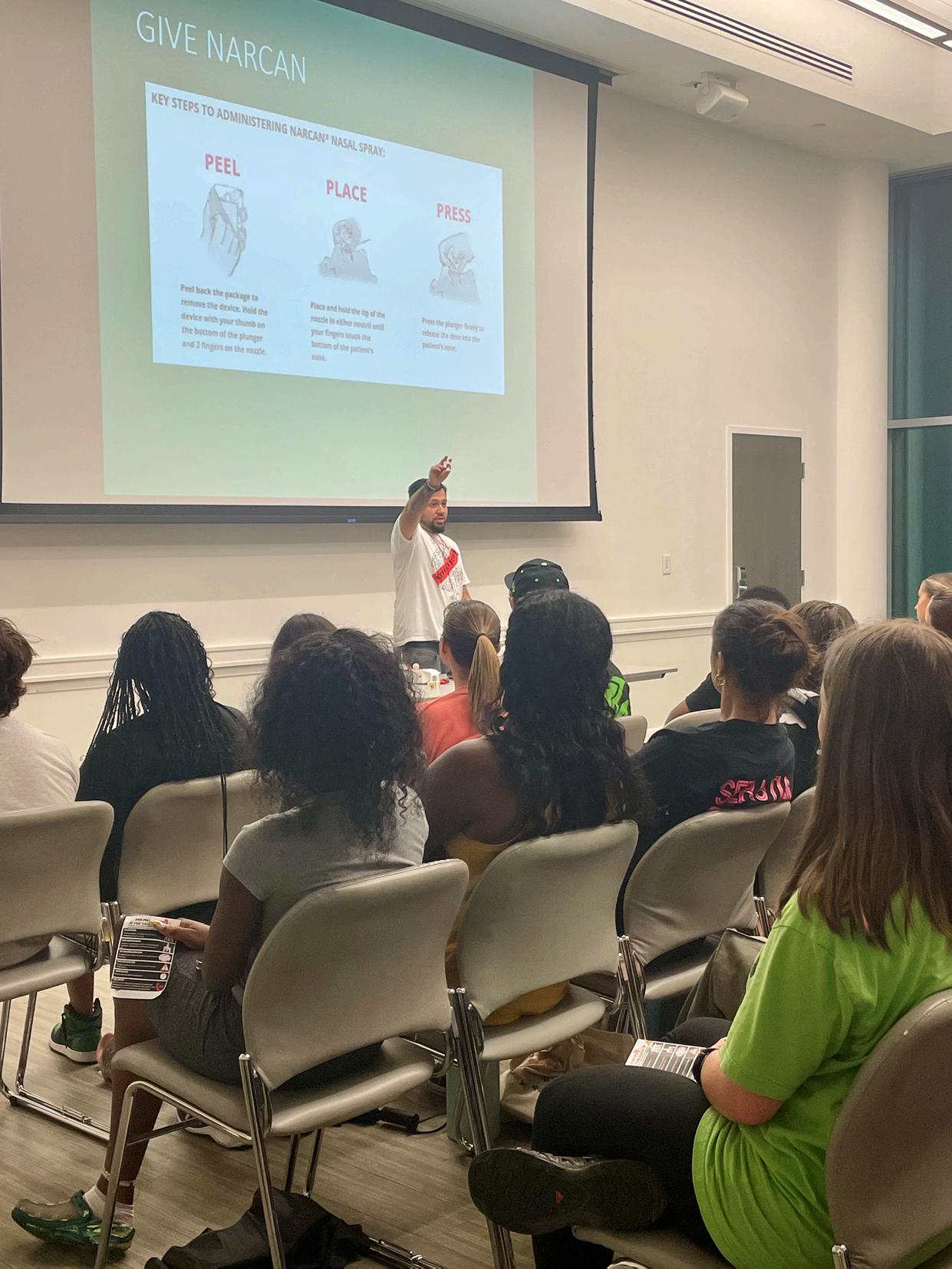

“Working for the Sandler Center has been an incredible experience, and there’s a lot to love about the job. Creating, designing, and leading as part of a team with my fellow peer educators and the graduate assistants is always rewarding. I love the inspiring and collaborative atmosphere the Sandler Center fosters. I love seeing how students at the university are learning from us, and making better, safer decisions in the long run. And I love every member of our team, who make the job as rewarding as it is.“
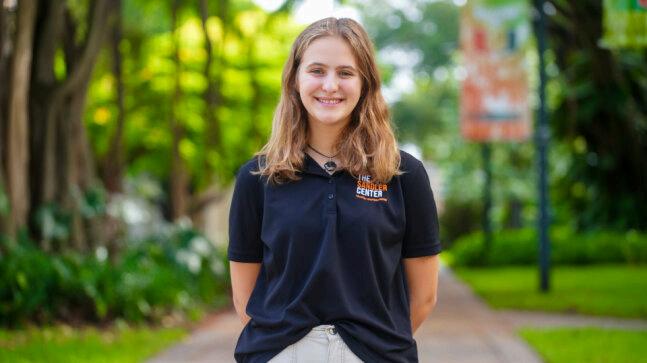 AbigailSchcolnik, JuniorPeer Educator
AbigailSchcolnik, JuniorPeer Educator
“The Sandler Center has helped prepare me for my future career by helping me improve my communication skills and public speaking. If it weren't for the Sandler Center, I do not think I would be nearly as equipped to do large group presentations and not only excel at them, but also enjoy my time! Additionally, The Sandler Center has allowed me to expand my design and creative skills by giving me a platform where I am free to create and find meaningful ways to communicate our messaging.“
NathanSherman, SophomorePeer EducatorDuring ‘Cane Kickoff, The Sandler Center staff joined other Healthy ‘Cane Network departments to meet incoming students and provide education about resources and the medical amnesty policy.
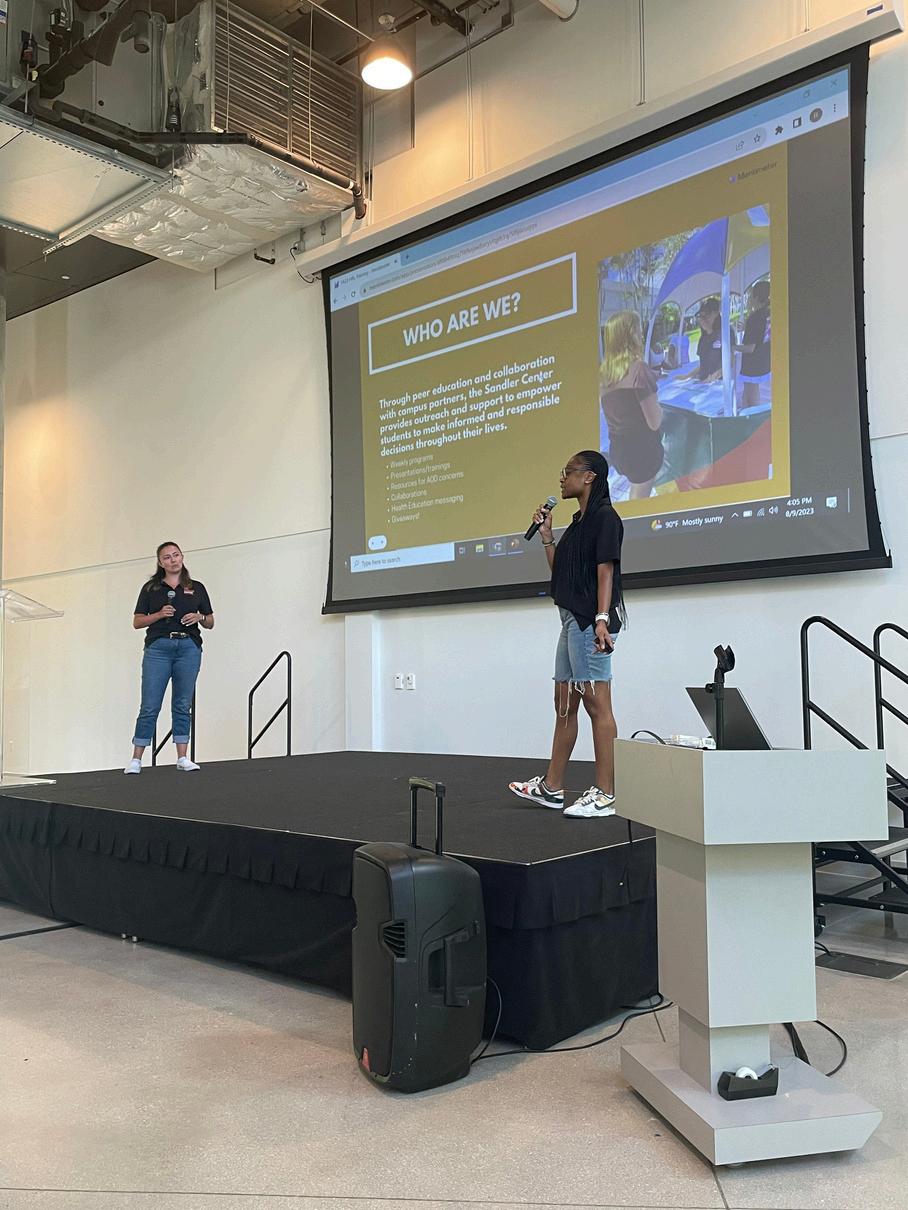

Sandler Center staff presented to Residential Assistants and First Year Fellows on binge drinking, medical amnesty, resources, and strategies to support students in residential colleges.
In November, we partnered with the Student Health Service to educate students on the dangerous substances found in vapes and the negative health effects of vaping.
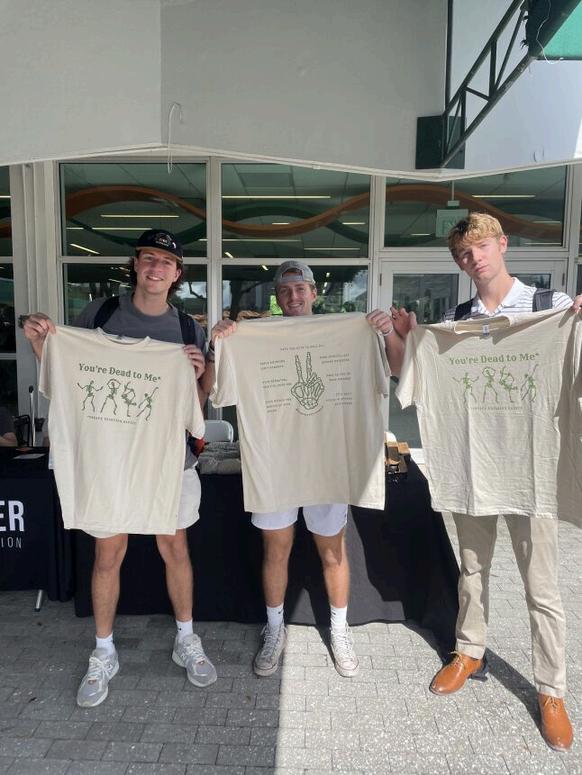
The Sandler Center joined members of AGLO to educate students on the impacts and consequences of driving under the influence of cannabis and the laws on cannabis in Florida.
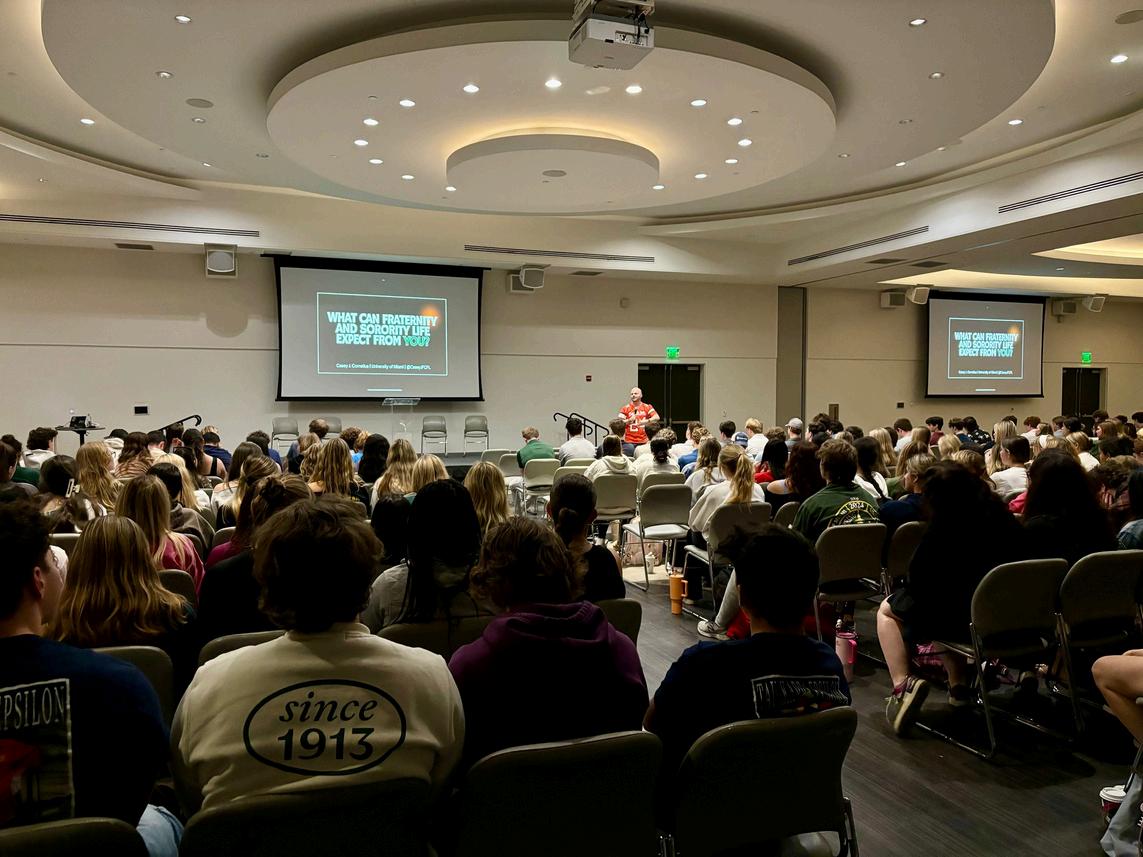
Collaboration

At the beginning of the Spring semester, we presented to all new members of Greek Life on strategies for safer drinking, bystander intervention, and resources.
We partnered with members of AGLO to share safety tips and resources prior to ULTRA Music Festival, including information about Narcan and dehydration.
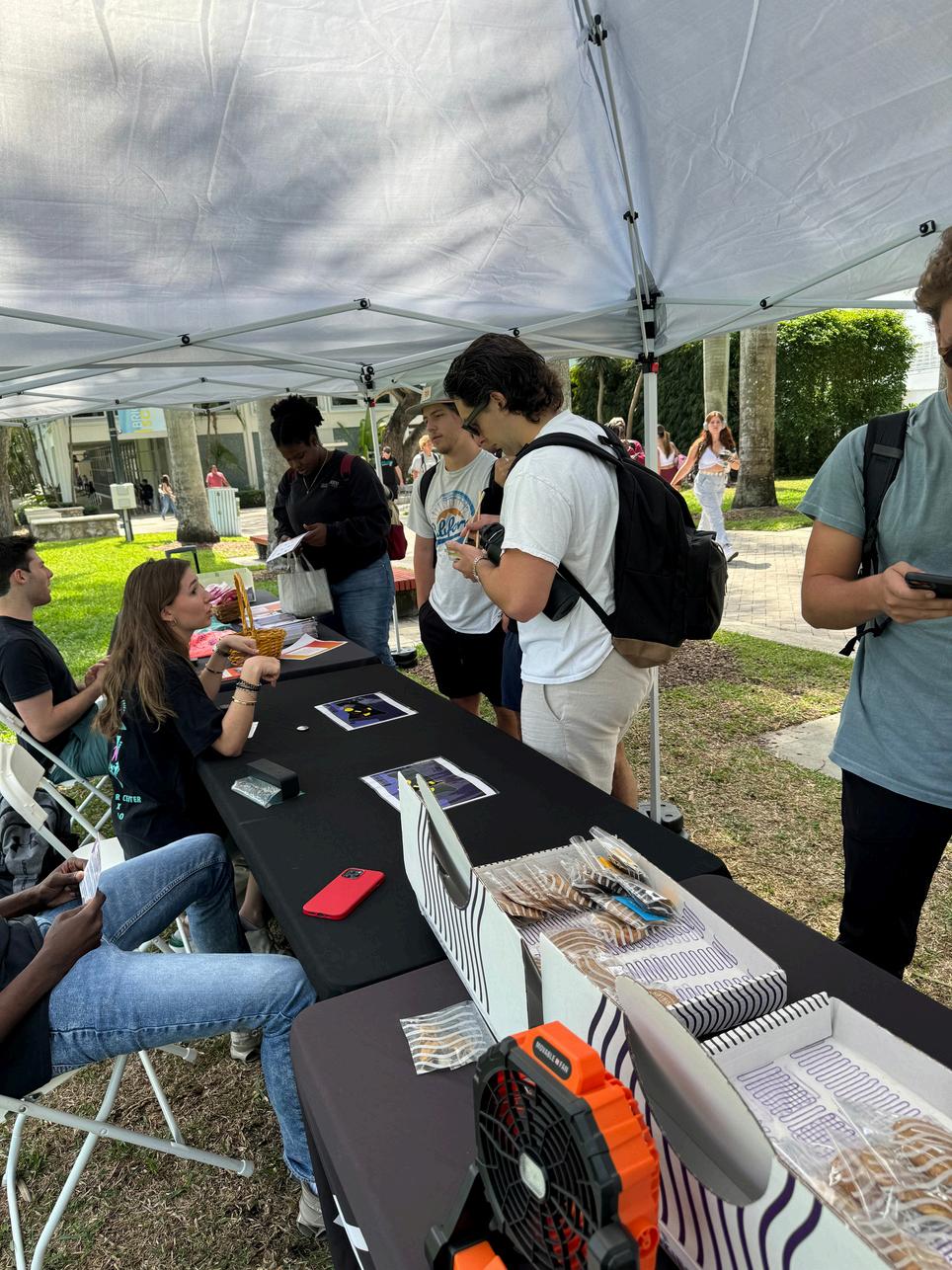
We continue to address alcohol- and cannabis-related violations on campus with our peer-led workshops, High(er) Education & Rethinking Drinking. The workshops include interactive trivia, engaging educational activities, opportunities for reflection and goalsetting, and information on campus resources. Upon completing the workshops, students are empowered as the primary agents of change in reducing the harms of their alcohol/drug use.

of students agreed that they examined their own personal alcohol
of students agreed that they examined their own personal
agreed that they have a better understanding of both Florida laws & UM policies surrounding alcohol agreed that they have a better understanding of both Florida laws & UM policies surrounding cannabis
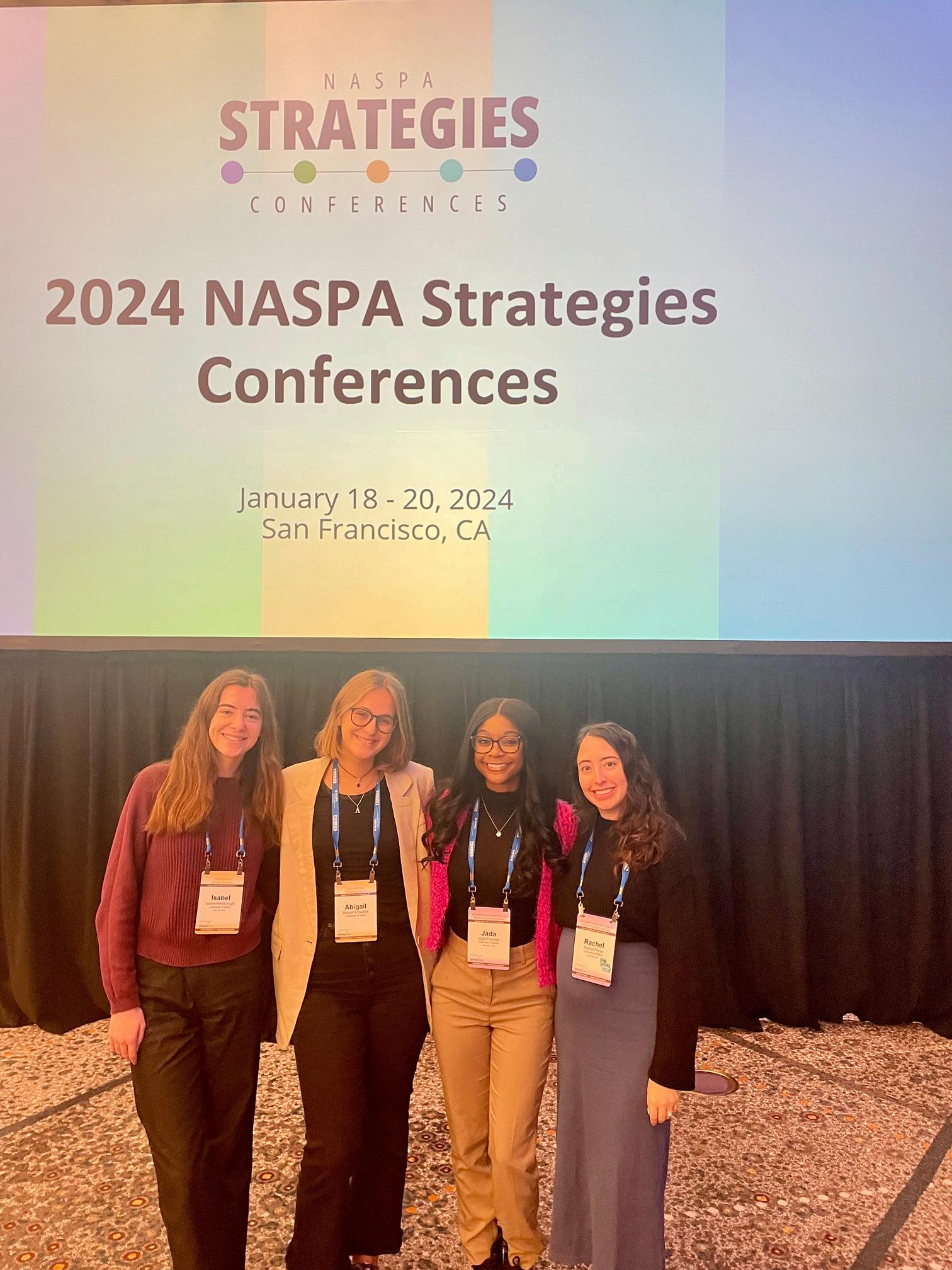

Team members attended the NASPA (Student Affairs Administrators in Higher Education) Strategies Conference in San Francisco, CA. This conference is an opportunity for students from around the country to gather with practitioners in an effort to better their leadership and organization skills as they prepare to present alcohol and drug prevention programs on their campuses. Sandler Center Director, Dean Perse, presented at the conference twice: a pre-conference session with the NASPA Peer Education Faculty entitled “Empowering Advisors: Strategies, Resources, and Best Practices for Peer Education” and a session with Aidan Wells from the Wellness Center entitled “From Campus to Career: Leveraging the Power of Peer Educator Experiences for Career Success.”
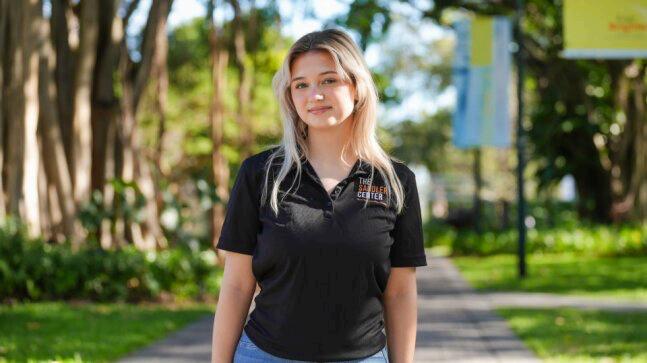
“Reflecting on my first semester as a peer educator at The Sandler Center, I am most proud of the environment we have continued to cultivate, where collaboration and initiative flourish. This supportive environment has not only nurtured my personal and professional growth, but also enabled our team to witness our efforts create a tangible impact on campus, which fills me with immeasurable pride.”
 RyanBerman, SeniorPeer Educator
RyanBerman, SeniorPeer Educator
“The Sandler Center has helped prepare me for my future career by allowing me to get hands on experience with projects in graphic design, film production, and social media marketing, which are all fields that I am interested in pursuing. Focusing on using my different skills to make a difference on campus has truly allowed me to grow and combine talents across multiple realms.”
Sandler Center team members hosted a Multicultural Focus Group. The main objective of this program was to invite students from different multicultural groups on campus to help The Sandler Center gain insight on how programs on campus can better support the diverse student body.
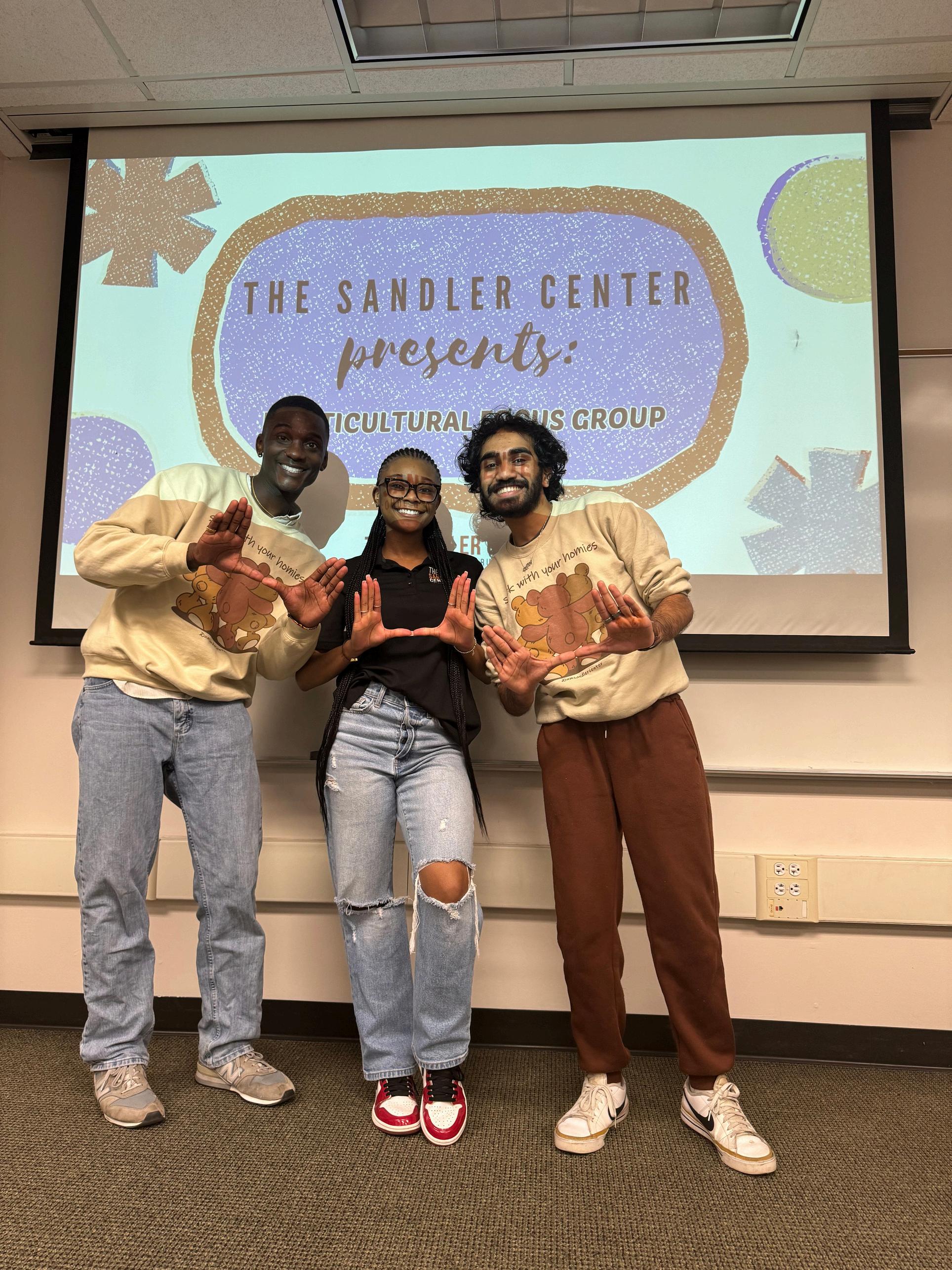
8 students were in attendance
Alcohol’s impact varies across diverse communities and students shared their experiences. For example: Drinking is more common in gatherings and the legal age in Mexico is 18, but normalized at 14 Families who have Catholic influences try to avoid drinking and partying
Students who come from more strict backgrounds have a harder time finding their tolerance/balance
Students stated that in-person events at the beginning of the school year set a tone for students on making responsible choices if they decide to use substances.
We hosted a student in the Bachelor of Science in Public Health program, Alexa Barroso, for her field practicum experience. The field practicum is an essential part of the public health program curriculum that blends academic learning and practical field experience in partnership with an agency or organization that is providing a public health service.
Alexa’s project involved delivering programs that address the impact of substance use on oral health. She organized two primary events, "Cocktails & Cavities" and "Smiles & Substances," during which we distributed oral health kits to attendees. Additionally, she conducted a baseline oral health assessment that reached 398 students, providing us with valuable insights. The feedback from the students was overwhelmingly positive, with many expressing a desire for the continuation of these programs.
